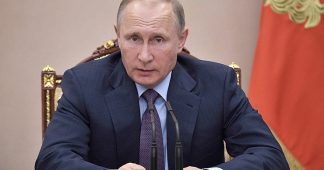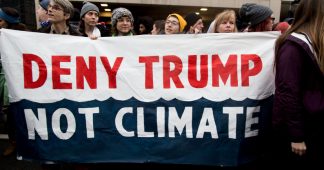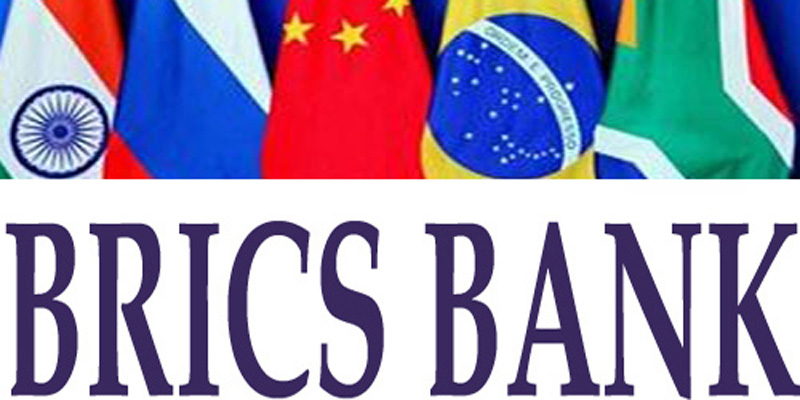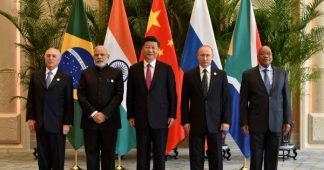Ministers of Environment and Heads of Delegation from China, Brazil, South Africa and India gathered in South Africa for the Fourth BRICS Ministerial Meeting on Environment. BRICS countries reaffirmed their support for the finalization of the work programme for implementation of the Paris Agreement and urged developed countries to keep with their commitments. Below is the joint statement issued at the conclusion of the Ministerial meeting.
Zimbali, Durban, South Africa
18 May 2018
We, the Ministers of Environment and Heads of Delegation of the Federative Republic of Brazil, the Russian Federation, the Republic of India, the People’s Republic of China and the Republic of South Africa, held the fourth BRICS Environmental Ministers’ Meeting in Durban on 18 May 2018.We reiterate our commitment to the importance of 2030 Agenda for Sustainable Development and the Sustainable Development Goals (SDGs), which clearly articulate international development priorities and global development cooperation towards the ultimate goal of eradicating poverty by 2030.
Through adopting the SDGs, the global community has undertaken significant commitments towards sustainability, development, and prosperity that is shared and equitable, leaving no one behind. The means and mechanisms are of critical importance in the implementation of SDGs and the BRICS countries hereby call for early implementation of the Global commitments towards Technology Facilitation Mechanism and Financing for Development.
We welcome various partnerships for the implementation of the 2030 Agenda for Sustainable Development and call for good governance to enhance implementation actions to integrate sustainable development at the heart of social and economic development policies in relation to Sustainable Consumption and Production (SCP).
With respect to Climate Change, BRICS countries welcome the progress towards finalizing the Work Programme under the Paris Agreement and express our willingness to continue working constructively with other Parties to conclude its related negotiations at the UN Climate Change Conference (UNFCCC) Katowice in December 2018. We reaffirm our commitments to the Paris Agreement and urge developed countries to continue taking the lead and support developing countries, including the transfer of needed technology, which is one of the most critical enablers for climate action.
We reiterate the call to enhance cooperation and collaboration amongst BRICS countries in the field of biodiversity conservation, sustainable use and equitable access and benefit sharing of biological resources, and also undertake to promote cooperation in biodiversity-related international conventions and fora including on endangered species.
We will continue to collaborate on these issues to ensure the success of the Convention on Biological Diversity (COP14) to be held in Egypt in November 2018, and 70th meeting of the Convention on International Trade In Endangered Species of Wild Fauna and Flora (CITES) Standing Committee in Russia in October 2018. BRICS countries committed to fully support the efforts of China in hosting the COP15 of CBD to be held in 2020. Furthermore, we noted with appreciation Brazil’s invitation to BRICS countries to attend and fully participate in the 67th International Whaling Commission (IWC) conference to be held in Brazil from 4 to 14 September 2018.
We reviewed and acknowledged the progress made on the key outcomes of the First, Second and Third BRICS Environment Ministers’ Meetings hosted by Russia, India and China respectively. These outcomes included progress with implementation of the Environmentally Friendly Technology Platform, Clean Rivers Umbrella Programme and the Partnership for Urban Environment Sustainability Initiative and undertook to continue to implement these initiatives.
We acknowledge the progress in the establishment of the BRICS Environmentally Sound Technology (BEST) Cooperation Platform. The BEST Platform is intended to be a practical and results orientated, which would include partners, science and international organisations, civil society, private sector and financial institutions, including the New Development Bank (NDB). We will use this BEST Platform as a coordinating mechanism for the implementation of agreed upon projects and programmes under the BRICS Environment Memorandum of Understanding.
We welcome the promotion of cooperation within BRICS in the area of waste management and pollution prevention, in particular the theme of the 4th BRICS Environment Minister’s meeting of “Strengthening cooperation amongst BRICS on Circular Economy in the context of the Sustainable Consumption and Production (SCP)”.
We reaffirm that the promotion of circular approach to Waste Management contributes significantly to the achievement of the SCP Goal as outline in SDG12 of the 2030 Agenda for Sustainable Development, as well as the United Nations Environment Assembly (UNEA) “Towards a Pollution Free Planet” theme.
We acknowledge that the circular economy approach in the context of SCP aims to keep resources in use for as long as possible, extract the maximum value from them whilst in use, then recover and regenerate products and materials at the end of each service life.
We welcome the vast potential in cooperation and collaboration in advancing the Oceans Economy amongst BRICS countries, which encompasses multiple sectors. We will explore enhancing our cooperation on Marine protection and ocean governance taking into account that the scope for cooperation may be limited to the programmes of environmental ministries, although the BRICS Ocean Economy cooperation will seek to influence and cooperate with all sectors of the oceans economy. We undertake to pursue this with the relevant government agencies and stakeholders, including the private sector.
We express our intention to enhance cooperation in the fields of water on the basis of sustainable development in an integrated way, addressing the themes of water security, flood protection, water supply and sanitation, water and climate and systematically facilitating water pollution prevention and control, aquatic ecosystem conservation and water resources management.
We underscore our collective interest in improving our national water infrastructure to secure and manage our natural water sources while considering the traditional knowledge of our indigenous and/or local communities related to water resources and the sustenance thereof.
We welcome the progress in the development on the Memorandum of Understanding (MoU) on Environmental Cooperation and look forward to signing it during the Chairship of South Africa of BRICS.
We also welcome the participation of UN Environment Programme and United Nations Industrial Development Organisation (UNIDO) in BRICS environmental cooperation.
We express our gratitude to the Republic of South Africa for hosting the 3rd Environment Working Group meeting (14 – 16 May 2018), 4th BRICS Environment Senior Officials and Ministers’ Meeting in Zimbali, Durban on 17- 18 May 2018.
We welcome the offer of Brazil to host the next BRICS Environment Ministers meeting in 2019.
Source: http://www.brics2018.org.za/











